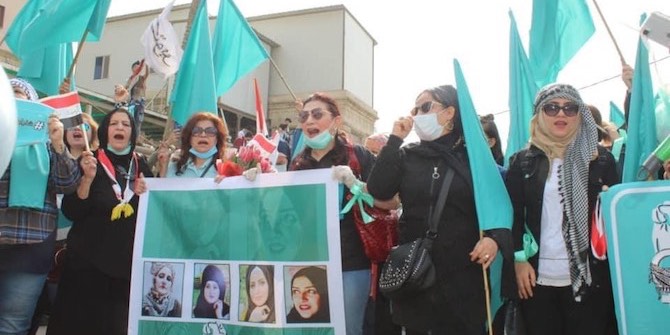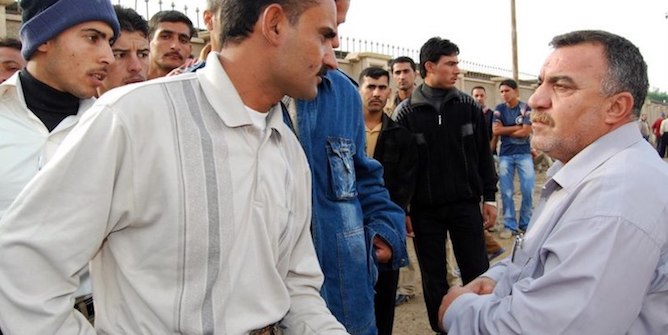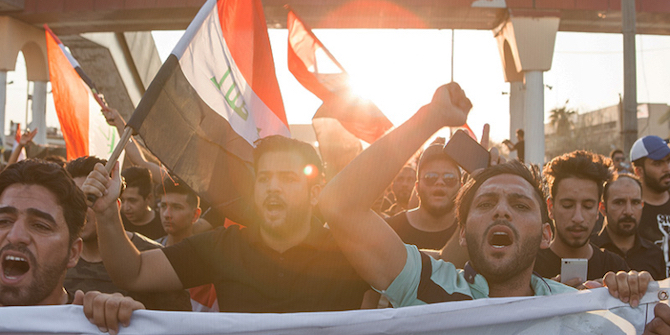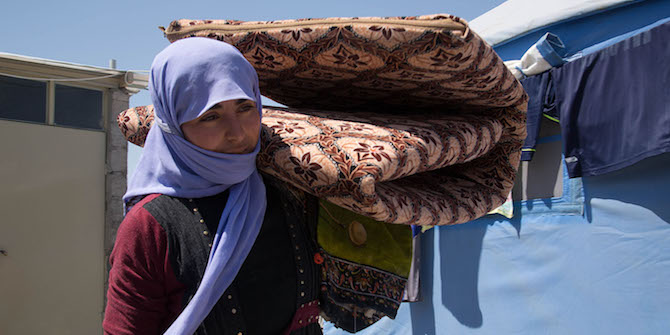by Pieter-Jan Dockx
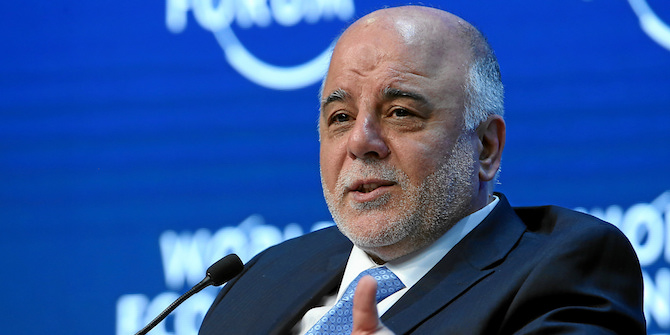
WORLD ECONOMIC FORUM/swiss-image.ch/Photo Valeriano DiDomenico
On Sunday 14 January, a spokesperson for Ammar al-Hakim’s National Wisdom Movement announced a trilateral alliance for the upcoming elections consisting of his own National Wisdom Movement, the Popular Mobilisation Forces (PMF), and Prime Minister Haider al-Abadi’s Victory and Unity list. Since al-Abadi primarily came to power to appease the Sunni community and is generally seen as a moderate figure, his decision to join Hadi al-Amiri’s PMF alliance took Iraq watchers by surprise. However, all of three days later, the coalition fell apart.
Before the failed alliance attempt, rumours had it that the current prime minister would form an alliance with Moqtada al-Sadr’s nationalist movement, either before or after the elections. This would not only have been in line with their shared nationalist and anti-corruption narrative, but would have also made political sense.
Facing competition for the highest office from Islamists like Nouri al-Maliki and the PMF’s al-Amiri, the Prime Minister would have been best placed in al-Sadr’s camp to secure a second term in office. As the cleric’s designs upon the office of prime minister have been unclear and his troubled past would make Sunnis distrustful of having him at the helm of affairs, al-Abadi was sure to be the prime ministerial candidate for the nationalist movement.
Since the prime minister had already decided to contest the elections on a separate cross-sectarian list rather than as part of his Islamist Da’wa party, it was expected he would join forces with the nationalists.
His decision to align himself with the former PMF leaders was even more surprising in light of his fierce opposition to the militia leaders’ participation in the upcoming elections. The prime minister also repeatedly stated that he aims to bring the PMF under state control – a move that would not have helped his short-lived alliance.
Immediately after the coalition formation, analysts still gave the prime minister the benefit of the doubt. Al-Abadi’s unexpected choice of the PMF was mostly seen as a result of Iranian interference. Tehran allegedly brokered the alliance which placed al-Abadi in the Islamists’ camp.
Although Iranian influence must have played a role, sources indicated to The New Arab that al-Abadi was the one setting conditions, and thus took the initiative to form the coalition. The move can therefore be best explained by pure electoral calculus and not Iranian influence.
Both the PMF and the Prime Minister lay claim to the victory over the so-called Islamic State (IS). An alliance between both actors would have brought to life a grand coalition that could ride the wave of support generated by the defeat of IS. It would have also presented the Shia constituent with a clear political option and prevented their vote from being split between the two parties. Despite his discourse on nationalism and cross sectarianism, the prime minister’s only concern seems to have been beating Nouri al-Maliki for a second term, which the alliance would have facilitated.
The move was also a testimony to al-Abadi’s political savviness, an attribute not often associated with the prime minister. While his recent victories against the Kurds in Kirkuk raised al-Abadi’s approval ratings, Hadi al-Amiri was the country’s most popular politician. As al-Abadi would most likely have been the main candidate as Prime Minister in the nationalists’ camp, the Prime Minister must have convinced al-Amiri to give him the top spot. Thus, by forming an alliance with the militia leader, Abadi guaranteed his position as prime minister and would have also neutralised his biggest challenger apart from al-Maliki.
The move also isolated al-Maliki himself. Thanks to their troubled history al-Maliki cannot form a coalition with al-Sadr, which left the former prime minister with only his ideological allies in the PMF. By forming an alliance with the PMF, Abadi left al-Maliki without allies and no chance at the premiership.
Al-Amiri would have also provided Abadi with qualities he allegedly lacks in challenging al-Maliki’s vote bank. Despite his decisive response to the Kurdish issue, al-Abadi came to power because he was seen as a weak leader who could lead the reconciliation with the Sunnis. Therefore, al-Abadi needed al-Amiri to provide the list with the necessary credentials to present as a strong Shia Islamist coalition.
The entire episode also paints a gloomy picture of Iraq’s future. Had al-Abadi formed a coalition with al-Sadr’s movement, they would have made for a formidable opponent against the Shia sectarians in the upcoming elections. Their alliance could have formed the basis for a cross-sectarian nationalist government with strong potential to address the country’s ills and lead the reconstruction efforts.
However, al-Abadi chose to align himself with the Shia sectarians. This completely undermines his entire discourse and demonstrates his lack of interest in tackling sectarianism and corruption in the country. As the Iran-linked PMF is widely known for their abuse and retaliatory attacks against Sunnis, a government composed of these militias would facilitate the continuation of Sunni repression, further marginalising the minority. By attempting to form a coalition with this sectarian organisation, Abadi legitimised the perpetuation of this practice.
Apart from delegitimising his nationalist discourse, joining hands with al-Amiri also completely undermined the Prime Minister’s international credibility and thereby his ability to attract reconstruction funds. Although European countries like Germany have already offered Baghdad credit lines to fund its reconstruction, these same countries have also called for an inclusive solution to the Iraqi conflict.
A new sectarian regime in Iraq would subvert this ideal of inclusiveness and would make donors wary of the new government’s intentions. This will lead to diminished international support for reconstruction, of which the Sunni community will again bear the brunt.
While IS’ devastating rule of Sunni areas has made the terrorist group highly unpopular, new organisations can carry the torch. Recently, al-Monitor reported that new groups consisting of Naqshbandi fighters and former allies of Saddam Hussein have cropped up in the sectarian hotbed of Kirkuk. Unlike IS, nationalist groups like Jaysh Rijal al-Tariqa al-Naqshbandia (JRTN) resonate with the local population. If they are allowed to grow, they can reenergise the Sunni insurgency.
Just like al-Maliki, al-Abadi rose to power not by virtue of his strength but because of his weakness. Just like al-Maliki, he too may now plunge the country into further sectarian conflict. Another Iraqi leader has succumbed to the sweet taste of power.
 Pieter-Jan Dockx is an independent researcher and intern at the Institute of Peace and Conflict Studies, New Delhi. He holds an MSc degree in Conflict Studies from LSE and his main research areas include Middle East and South Asian politics. Read more of his blogs at www.pieterjandockx.com
Pieter-Jan Dockx is an independent researcher and intern at the Institute of Peace and Conflict Studies, New Delhi. He holds an MSc degree in Conflict Studies from LSE and his main research areas include Middle East and South Asian politics. Read more of his blogs at www.pieterjandockx.com



